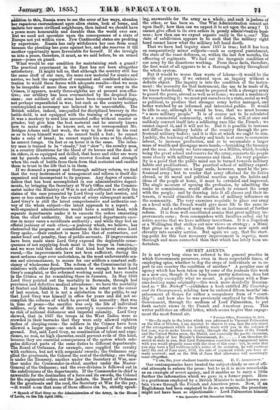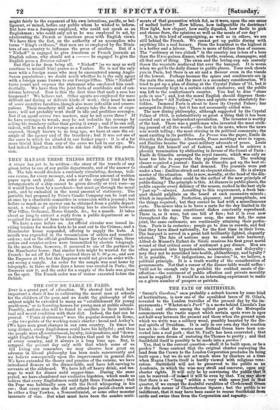SECRET AGENTS.
Ix is not very long since we referred to the general practice in which Governments persevere, even in these respectable times, of employing spies, whether to dog the steps of individuals or to re- port to one country the condition of another.' A peculiar case of agency which has been taken up by some of the journals this week as a new- one, though it has long been pretty notorious, does but imperfectly exemplify what we meant. A gentleman with a Rued- sian-looking name originally—this week more decidedly Russian- ized as "Mr. Niehoff"—publishes a book entitled My Court8lzi4) and its Consequences, relating how he endured fifteen months' im- prisonment at Genoa for rather a compulsory form of " court- ship "; and how also he was previously employed by the British Government, through the medium of Lord Palmerston, to put forth certain views in the French and American press. This writer publishes an official letter, which seems to give that engage- ment the most formal air.
" Foreign Once, November 24, 1851.
"Sir—In reply to the letter which you addressed to Viscount Palmerston on the 21st of October, I am directed to observe to you, that the sole object of the arrangement which his Lordship made with you in the autumn of last year, was to make known clearly, through the medium of the French and the United States press, the liberal, and especially the pacific character,
of the policy of her Majesty's Government, &c I am therefore di- rected to state to you, that Lord Palmerston considers the engagement taken with you would properly cease with the close of this year : but, in order that you may have a full twelvemonth's notice of its cessation, he will continue until the end of Tune next, 1852, the rate of payment which you have al- ready received ; and on the 30th of June that allowance will accordingly cease altogether. "I am, Sir, your obedient humble servant, H. U. ADDLVOTON." Our contemporaries have treated the subject chiefly as one of offi- cial attempts to suborn the press : but to us it is more remarkable as an example of secret agency, and. it enables us to carry a little, further the information which we gave in a former paper. Here is a gentleman employed by a British Minister to make known cer- tain views through the French and American press. Now, If at Englishman had been employed to do so, co nonune, the procedure might not have been so objectionable : Lord Palmerston- himself Bee Spectator of 9th December 1854. might fairly be the exponent of his own intentions, pacific, or bel- ligerent, or mixed, before any public whom he wished to inform. But here was a foreigner employed, who could not speak as an Englishman ; who could only act as he was employed to ad, by adulterating the French or American press with English views. We have then the fact, on the authority of an accomplice who turns "King's evidence," that men are so employed by the Minis- ters of one country to influence the press of another. But if a " Nichoff" is engaged to give American or French journals an English colour, why should not a — be engaged to give the English press a Russian colour ? But that is far from being all. " Nichoff" (as we may as well continue to miscall him) passes as a Yankee. He is not the only man with a foreign name who may be encountered among Anglo- Saxon populations ; we doubt ranch whether he is the only agent with a foreign name known to our Foreign Office. This " Nichoff" turns round and exposes the statesman who employed him confi- dentially. We have then the joint facts of confidence and of con- fidence betrayed. Now is this the first time that such a ease has happened ? We believe not. Other agents are employed for more difficult and daring or delicate kinds of work ; they must be men of more secretive faculties, though also more inflexible and unscru- pulous. Their treachery will not always take the form of expo- sure ; will not probably vent itself in idle and profitless revenges. But if an agent serves two masters, may he not serve three? If he have revenges to wreak, may he not redouble his revenge by selling his treachery rather than giving it away ; and if he can sell, indeed, will he wait for revenge as a motive ? In the case recently exposed, though known to us long ago, we have at once the ex- ample of the agency and of the treachery; but it was not one of the cases to which we alluded in our former paper : it is of a far more trivial kind than any of the cases we had in our eye. We had indeed forgotten a trifler who did but daily with the profes- sion.



























 Previous page
Previous page